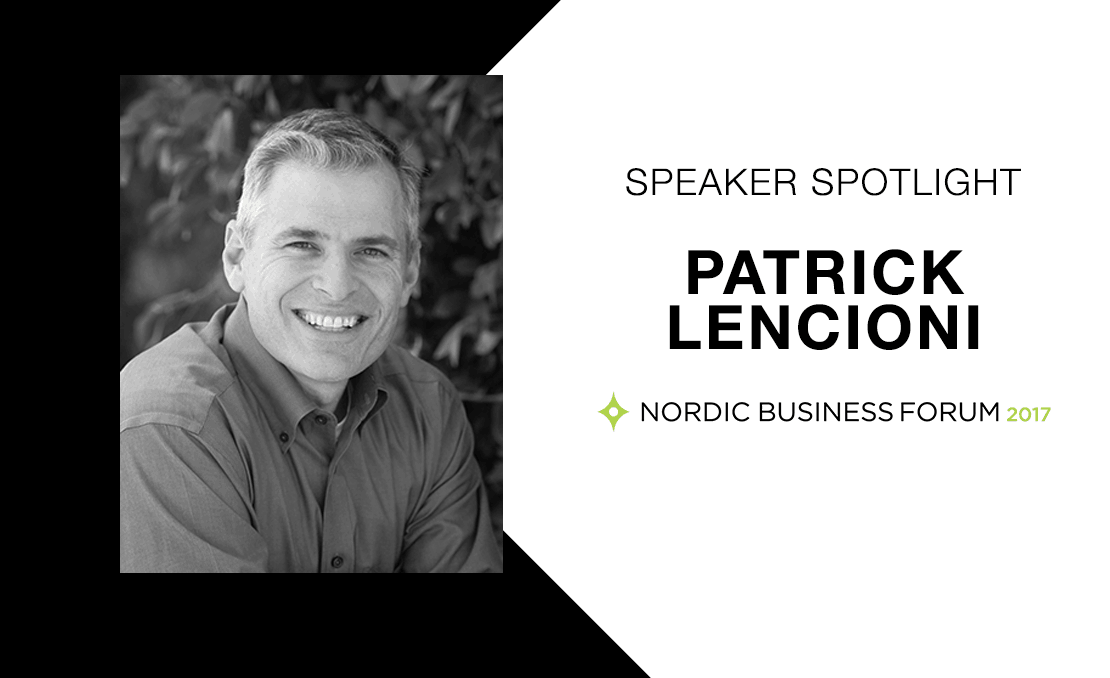29Aug2017
To continue our 2017 Speaker Spotlight series, we welcome the wonderful Patrick Lencioni!
Speaker Spotlight
Politics. Bureaucracy. Confusion. Of all the things that these words describe, business should not be one of them. And yet, they have become accepted as the inevitable corporate penance that one must pay to be an employee. But what if there was another way? What if there was an alternative that could drastically reduce these problems and boost productivity and morale? Enter organizational health (OH), the secret behind effective companies.
Patrick Lencioni is founder and president of The Table Group, a firm dedicated to providing organizations with ideas, products, and services that improve teamwork, clarity and employee engagement. Lencioni is the authority on OH, which he detailed in his book The Advantage: Why Organizational Health Trumps Everything Else in Business. He sat down with us to discuss building a cohesive leadership team, establishing and communicating clarity, and becoming a better leader.
Nordic Business Forum: Hi Patrick. You’ve written a series of books on teamwork, dynamics, and leadership — and The Advantage ties all these threads together. In your experience, why do you think teams fail?
PL: I think the underlying reason is that human beings are fallible, imperfect creatures and when you put them in a room together, all those imperfections and issues tend to bounce off one another and create problems. We don’t like to be vulnerable and we struggle with humility — and that is just being completely honest about who we are and what we think. We want to present ourselves to be something we’re not, and the problem starts from there.
Humility and vulnerability are at the core of great teamwork and great leadership, so a lack of those two things would be why I see teams fail. And, of course, there’s the rest of the dysfunctions: we don’t like to argue even when we need to, we don’t hold each other accountable… but it really stems from a lack of humility and vulnerability.
But there is a saving grace to it all because I think that all people like to be successful and do their best. When the desire to be your best overwhelms your fear of being vulnerable and humble, that’s what creates the inertia to succeed. And then there is grace itself — people actually forgive one another and give each other a break. Successful teams are made up of people who are capable of saying “Hey, I know you’re human and that’s okay.”
Forgiveness is really at the heart of being able to overcome our lack of vulnerability.
NBF: Wise words, and likely easier said than done! You’ve spoken about the factors that shape the behavior of individuals and of groups. How do you think an individual’s passion for their work affects work groups and team dynamics?
PL: I think passion is really important. I have found, though, that there are a lot of people who do what they love, but if they’re on a dysfunctional team, it can destroy it. And then there are other people who don’t do what they love, but if they work with really good people, they can love their work.
I always thought that job satisfaction was primarily driven by what you do, but I’ve come to realize that it’s even more driven by who we work with, and the environment, and the way you work together.
What people really need in order to love their work is to be known by the people they work for. They need to know why their job matters to other people in the world, whether it’s their customers or vendors or anyone else. They need to know if they’re doing a good job.
I’ve worked with people who had their dream job but, because their manager didn’t know them, they didn’t really understand why they were doing their job. Their manager didn’t help them see their value, and so they had no way to assess their success. They were miserable.
On the other hand, I’ve worked with other people who have what may seem like not very attractive jobs but, because their manager was interested in them as a human being, they knew why their job mattered to someone else, and they could assess their success. They actually were very happy.
So, we’ve come to learn that being on a team and being well managed can take an average job and make it great. And being on a dysfunctional team and being poorly managed can make even the sexiest sounding job pretty miserable.
NBF: You’ve written about how some managers may recognize good employees but fail to communicate it properly because of competing factors, such as company politics. How can managers communicate feedback and value more effectively?
PL: The most important thing is to understand the person you’re talking to — and remember that giving feedback to one employee is not the same as giving it to another. What I mean by that is, whether you’re using Myers-Briggs or DISC or any other working styles, if you know that a person is particularly sensitive and introverted, you’re going to have a very different feedback session with them than with a person who’s hard-driven and extroverted.
You see, we tend to think about the way we give feedback in terms of our own personality as a leader rather than adjusting for the personality of the person receiving the feedback. Great managers are versatile and they know how to communicate in a way that matches the needs of the person they’re talking to.
Now, that doesn’t mean they alter the truth or the ultimate message, but it’s the way that you present it to a person that changes. And to do that, you have to understand what makes them unique. Being versatile and really considering the person you’re talking to is the key to giving feedback.
NBF: What advice do you have for managers who want to be better leaders?
PL: Well, one question that people don’t ask me enough is: can you be a great leader if you’re not a good person? You know, is it important to be a good parent and/or spouse in order to be a good leader?
People read books about being a better leader, which is fantastic, but in other parts of their lives, they might not pursue things with the same amount of passion. To them, I would say: to be a better leader, start with those things in your life that are closest to you.
I don’t know how I could be a good leader at work if I weren’t doing what my wife and my kids needed at home. I think that when those things are sound, I find that it’s a lot easier and makes more sense to become a great leader.
NBF: What’s the one thing you want people reading this interview to learn from you?
PL: Know that being humble and being vulnerable is the beginning of personal growth and organizational growth as a leader. If you can get people to let down their guard and be real, that’s worth pursuing. There are very few things in life, and even fewer in business, where the right decision and the best decision are one in the same. After 20 years in business consulting to organizations all across the world, I am utterly convinced that what is best for your company, best for your employees, best for your customers and best for your bottom line, is a wholehearted commitment to organizational health. It isn’t too good to be true.
We’re excited to learn more from Patrick Lencioni at NBForum 2017! We’re already sold out, but if you’d like to hear Lencioni and other leaders discuss this year’s themes of purpose, responsibility, and leadership, be sure to grab your Live Stream license today. Follow us on Facebook (@NBForumHQ) and Twitter (@NBForumHQ and #NBForum2017) to keep up with our speaker announcements as we get closer to the event!

 by:
by: 
